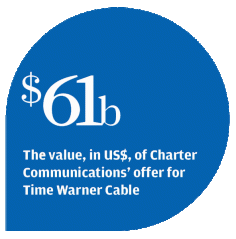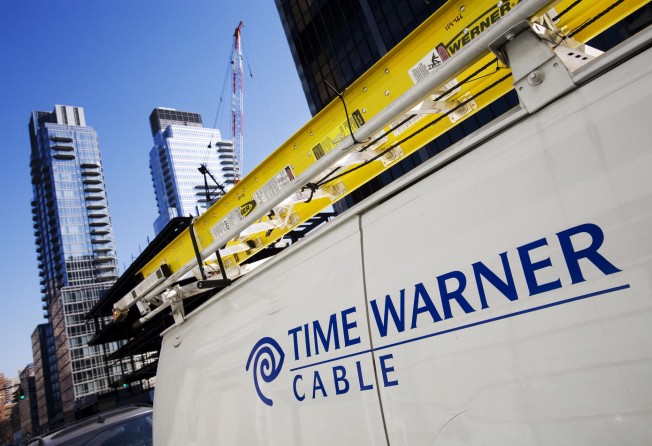
Time Warner Cable chief rejects Charter's 'low-ball offer'

Time Warner Cable has rejected a takeover offer from Charter Communications valued at more US$61 billion including debt, spurning the biggest unsolicited bid since 2008.

The proposal included about US$83 cash per share and about US$49.50 in stock, according to Charter. Excluding debt, the deal would be worth about US$37.3 billion.
Charter, backed by John Malone, is seeking to create a provider of television, internet and telephone services for about 20 million subscribers in 38 American states. The combined company would be the third-largest pay-television operator by customers - behind Comcast and DirecTV - helping it generate cost savings and negotiate better programming deals.
"We haven't received a serious response," said Tom Rutledge, Charter's chief executive. "Our objective was to talk to management and try to get them engaged. They have not, so we're going to make our case to shareholders about why this deal is good for them and hope they ask management and the board to watch out for the interests of shareholders."
Charter sent a letter to Marcus on Monday explaining why the company's offer was beneficial for shareholders. Rutledge said he last proposed an acquisition late last month.
Time Warner Cable's board rejected Charter's offer, calling it "grossly inadequate".
Marcus said the company was open to a deal with Charter for US$160 a share, or US$100 in cash and US$60 in Charter common stock.
"Here's what happened: we didn't put our house up for sale, and we got a knock on the door and someone made a low-ball offer," he said. "They want a premium asset at a bargain-basement price, and that's just not going to happen."
Time Warner Cable's shares rose 1.8 per cent to US$134.75 after the close in New York on Monday, giving it a market value of US$38 billion. It has climbed about 40 per cent since June last year on renewed speculation of cable-industry mergers.
Rutledge and Charter chief financial officer Chris Winfrey met Marcus and Time Warner Cable chief financial officer Artie Minson last month to walk through details of the offer, including structure, financing, tax and cash-flow implications, according to the letter. Charter indicated its willingness then to submit a proposal at the low US$130-a-share level, including a cash component of US$83 a share.
When Time Warner Cable responded to that with a request for a higher bid including a higher cash component, Charter determined its bigger rival was not interested in pursuing a merger agreement.
Time Warner Cable shareholders would own about 45 per cent of the new company in the proposed deal, Rutledge said. The combined firm would have more leverage in future talks with content providers, which have been raising annual prices at about 10 per cent per year. An acquisition would also allow Charter, the fourth-largest cable operator, to use its net operating losses as a future tax shield.
Moreover, Charter would improve Time Warner Cable's customer service and restart video growth, Rutledge said. "Since we made our first proposal, Time Warner Cable has lost another half million video customers."
Time Warner Cable lost 215,000 video subscribers in the fourth quarter after a 304,000 loss in the previous three months. The firm has the lowest customer satisfaction score among all US pay-television operators and the second-lowest score among all companies ranked in the American Customer Satisfaction Index.